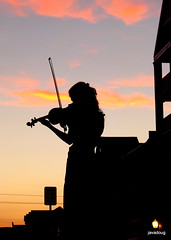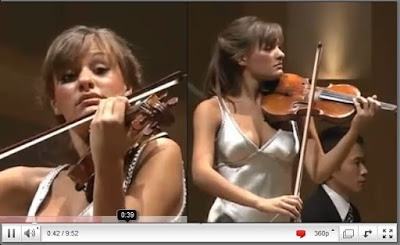Paul Silver of the PSO viola section introduced the piece -- "with the understanding that emotional and spiritual healing must also occur -- we hope a spirit evocative of music, born upon gentle waves can make their way back to Japan, as they rebuild their lives."
Slowly, softly, the music began. It seemed to move forward, as if with steps, and often asking a question. The effect and use of dissonance seemed to tug at my heart, elucidating a a sense of sorrow. Yet musically very pleasant. Often different sections of the orchestra would start off at a different pace, and then end a phrase together again. I imagined it would be a difficult piece to play. At the end there was no applause, as requested by the introduction - just silence
 .
.Next they PSO staff brought in the piano and the violin players returned. With that I imagined it would be hard for both the orchestra and audience to quickly switch emotional context. Indeed, the human spirit needs time to rebuild, but that's always what we do, we tend to rebuild.
With the Beethoven Co. No. 2, Johnathan Biss had no trouble taking up the melodic passages, blending elegantly with the Pittsburgh Symphony Orchestra. The synchronization with the orchestra was indeed exquisite - Andris Nelsons gets much of the credit for this - he was able to pull the orchestra in at just the right moment, keeping time with his baton like a metronome. Beethoven, being my all time favorite composer, can't miss with any of his music. And to hear it live with the PSO was a great treat. The last movement is the most famous, and was performed with plenty of alacrity by the soloist and the orchestra.
The last time I heard Scheherazade was on the boardwalk in Ocean City last summer.
 She played for donations, and really was quite good. She was an immigrant, from eastern Europe, Romania if I remember (I asked), and she indicated she was working her way through school. Now that's the spirit of hard work and doing what you love, even if it is as a way to help make extra money to try to accomplish your goals.
She played for donations, and really was quite good. She was an immigrant, from eastern Europe, Romania if I remember (I asked), and she indicated she was working her way through school. Now that's the spirit of hard work and doing what you love, even if it is as a way to help make extra money to try to accomplish your goals.Indeed it reminded me of the story of: 'Scheherazade, the fictional teller of the stories known collectively as "One Thousand and One Nights" or sometimes "Arabian Nights". Doomed to death by a vengeful sultan, Scheherazade prolongs her life by telling the king a new story for a thousand nights. When she finally runs out of stories, the sultan has fallen in love with her and makes her his queen. Rimsky-Korsakov used the story of Scheherazade as the inspiration for his popular programmatic work, with its familiar musical (and literary) themes.'
This story came to me as an introduction to the performance, and I placed it here because it seems the perfect place to reflect on the human spirit. It keeps on working, striving to recover from setbacks, or to avoid pitfalls. This evenings performance was indeed an inspiration. And to say the least, one fantastic performance by the PSO, famously led by the guest conductor Andris Nelsons, who seemed to soar off the stage as he leaped in the air - I'd even see the reflection of the felt red of the podium on the souls of his shoes.




